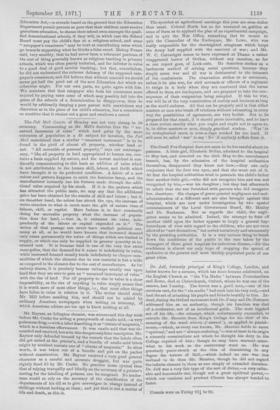The Pall Mall Gazelle of Monday was not very strong
in its 'economy. Commenting on Mr. Mill's doctrine that the " un- earned increment of value" which land gains by the mere -extension of population is a fit subject for taxation, the Pall Mall maintained that a similar " unearned increment " is to be found in the yield of almost all property, whether land or not. " All moveable or personal property," says our contempo- rary, " like all property in land appropriated to human use, con- 'tains a basis supplied by nature, and the merest accident is con- stinually communicating to this basis an addition of value which is not attributable to the human skill, labour, and thrift which have brought it to its perfected condition. A fabric of a new 'colour and pattern happens to catch the feminine fancy, and the manufacturer instantly has his fortune made through the addi- stioual value acquired by his stock. If it is the pattern which has attracted the public taste, we may say that the additional price has been obtained for the results of skill and labour ; but if, on the other hand, the colour has struck the eye, the increase of -value attaches to what is much more the gift of nature than of 'labour, skill, or capital. Mere fashion is in fact constantly doing for moveable property what the increase of popula- tion does for land, — that is, it enhances its value, inde- pendently of the labour or capital expended on it." The writer of that passage can never have studied political eco- nomy at all, or he would have known that increased demand only raises permanently the value of things which are limited in supply, or which can only be supplied in greater quantity at in- creased cost. It is because land is one of the very few strict monopolies, that the demand for it raises it indefinitely in value, while increased demand usually tends indefinitely to cheapen com- modities of which the element due to raw material is but a trifle as compared to the element due to the cost of manufacture. As for railway shares, it is precisely because railways usually run upon land that they are sure to gain an " unearned increment of value " with the rise of land. For all property to rise in value is a sheer impossibility, as the rise of anything in value simply means that • it is worth more of most other things, i.e., that most other things have fallen in value in relation to it. The writer should study Mr. Mill before assailing him, and should not be misled by -ordinary American newspapers when writing on economy, of which American editors are too apt to know nothing at all.






























 Previous page
Previous page